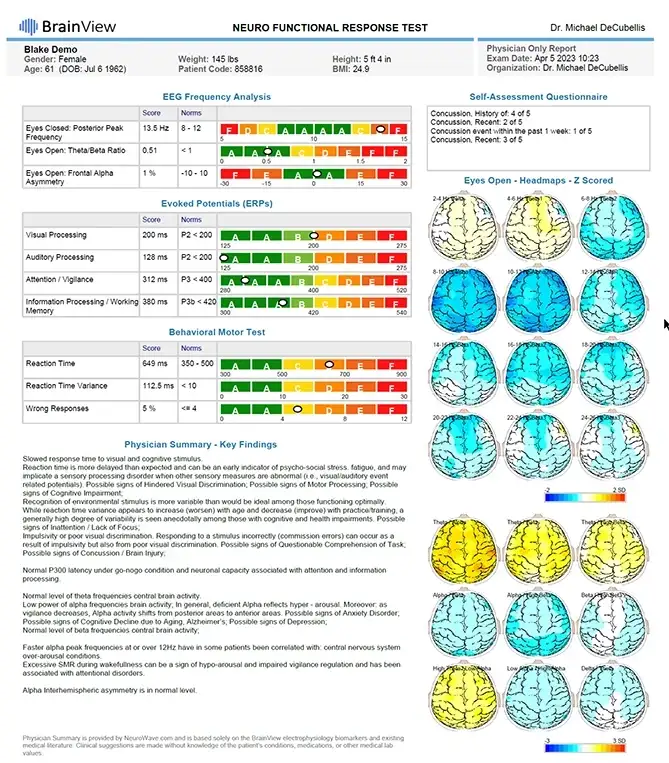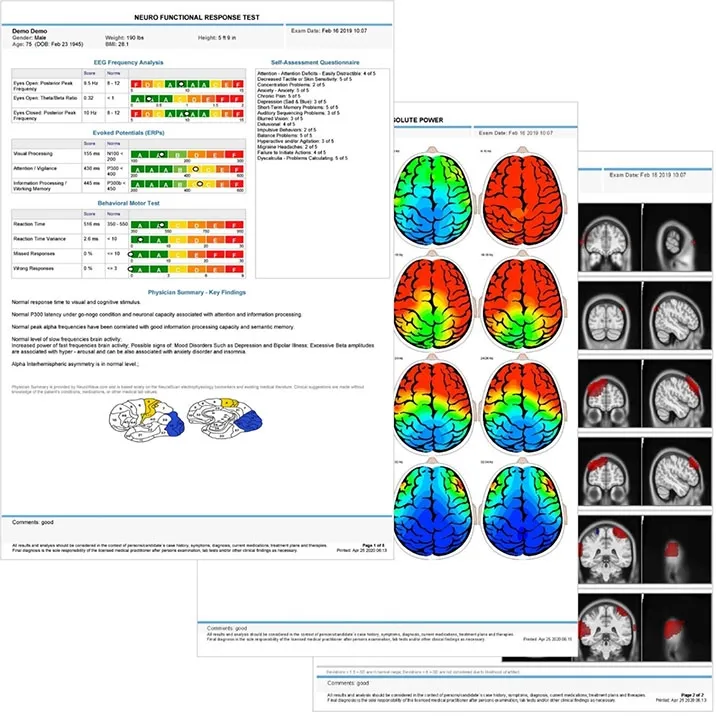Brainview Neurocognitive assessment in Downers Grove IL
BrainView is a cutting-edge hardware and software system in Downers Grove IL, that allows the detection of neurological conditions.
BrainView is a state-of-the-art system that provides the following:
- Electroencephalography (EEG), evaluating the activity of the brain
- Electrocardiogram (ECG), assessing the activity of the heart
- Evoked potentials assess the visual and auditory processing speed
- Subjective neuropsychological survey.
There are several reasons why cognitive impairment occurs. However, it can also happen at any age. BrainView helps clinicians with objective data on a patient's core brain functions like memory, attention, information processing, and executive function.
BrainView can identify symptoms of cognitive dysfunction such as fatigue, memory loss or brain fog, Anxiety, Depression, PTSD, TBI, Migraines, Sleep Disorders, OCD/ADD, in some cases several years before they manifest.
BrainView device is a USA FDA 510(K) cleared Class II medical device. The system acquires, displays, and stores a recording of the electrical activity in a patient's brain through (EEG) and event-related potentials (ERP) obtained by placing two or more electrodes on the head to aid in diagnosis.

Request
An Appointment
Benefits of Brainview Testing in Downers Grove IL
- It Helps improve clinical outcomes through early assessment
- Detects declines in memory up to 15 years before symptoms
- May detect head injuries that a CT or MRI may not
- Quick and easy assessment in Glastonbury, CT
- Assess the underlying cause in patients suffering from chronic pain
- Assists with treatment interventions
- It helps to understand ADHD in children better, leading to better outcomes and treatment solutions.
Report
BrainView’s medical software report is generated using data gained from EEG and ERP and compared to BrainView's database of healthy cognitive functions. Together with clinical findings, this information is used to determine healthcare providers' diagnoses and medical decision-making.
BrainView complements clinical protocols and assists in tracking brain health over time, provides valuable data in the diagnostic process and helps inform customized treatment strategies.
During treatment, repeat BrainView assessments track changes in a patient's cognitive scores to monitor their progress and validate the efficacy of therapy, helping healthcare providers to maximize patient outcomes and expedite recovery timelines.
There are many steps we use to create a BrainView report:
- Acquisition of the EEG recording
- Removing artifacts from the recording
- Viewing the artifact record to determine if any transient behaviors persist
- Reviewing FFTs, spectral displays, and other digitally filtered images
- Comparing the subject to a normative database.
- Isolating pathologies
- Writing the report
Why we are different
- Scores multiple core cognitive functions
- Limitless brain health applications
- Supports any clinical group
- Available to patients 8-90 years of age
- 30+ years of peer-reviewed studies and research
- Proprietary, evidence-based EEG protocol
- Proprietary medical software
- Non-invasive testing
BrainView’s Importance in Finding Disorders
BrainView is crucial for uncovering the underlying cause and adequate treatment for a variety of disorders, including:
Physical disorders: Brain mapping can help your healthcare provider detect the presence of tumors or other brain injuries through structural brain imaging techniques before it is too late.
Emotional disorders: Some brain mapping techniques, such as EEG, can determine the underlying cause of symptoms. In addition, by looking at patterns of electrical activity, thought patterns behind emotional conditions or addictions can be identified.
Cognitive disorders: Brain mapping can help psychologists, physicians, and other healthcare providers find the root causes of mental disorders like depression, anxiety, memory loss, and more
What will a BrainView assessment show?
BrainView assessment will identify aspects of brain health, including cognitive function, cognitive impairment, biomarkers associated with memory loss and cognitive impairment, autonomic nervous system function, and physiologic function related to memory loss, sleep disorders, anxiety, and attention deficit.
What does BrainView help identify?
- Memory loss or Dementia.
- Traumatic Brain Injury
- Depression
- Sleep Apnea
- Anxiety
- Chronic Pain




